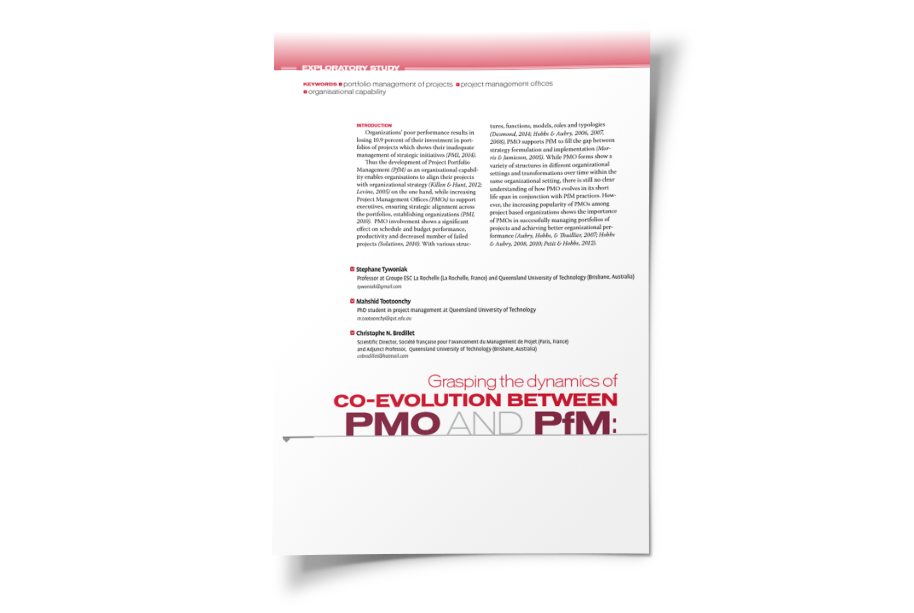Grasping the dynamics of co-evolution between PMO and PfM: A box changing multilevel exploratory research grounded in a routine perspective
Abstract
Organizations’ poor performance results in losing 10.9 percent of their investment in portfolios of projects which shows their inadequate management of strategic initiatives.
Thus the development of Portfolio Management of projects (PfM) as an organisational capability that enables organisations to align their projects with organizational strategy on the one hand, and concurrently, the raise of Project Management Offices (PMOs) to support executives ensuring strategic alignment across the portfolios, organizations establish.
PMO supports PfM to fill the gap between strategy formulation and implementation. While PMO forms show a variety of structures in different organizational settings and transformations over time within the same organizational setting, there is still no clear understanding of how PMO evolves in its short life span in conjunction with PfM practices.
However, the understanding of co-evolution processes of PfM practices and PMOs as organizational settings remains unclear, partly because the past and current studies rely on a being ontology in order to study change and evolution and because they are mostly based on single level or flat perspective locating phenomena in “a web of interconnections”. Taking a routine perspective and a process and becoming view we offer in this exploratory study:
1. A multi-level conceptual framework unveiling the dymamics of co-evolution between PfM practices and PMO as organizational / organizing entities. To this regards this research could be called a box changing research as, if the primary point of reference is the PfM and PMO literature, we call for routine lens.
2. An assumption challenging approach based on a process and becoming ontology, supporting a somehow innovative research, involving a multilevel or tall view linking local praxis level, i.e. PfM routines, with higher level of structure and system, i.e. PMO.
Potential Industry Impact
- The top-level managers can realise if costs of establishing a PMO brings enough value to the organisation in the long term. The PMO has become a well-known organisational phenomenon. In many organisations, organisational leaders start implementing a PMO without a clear perception of what the organisation really requires. The great variety of PMOs (Hobbs & Aubry, 2006, 2008) makes implementation of the PMO more challenging. Therefore, resemblance of PMOs never guarantees the same organisational outcomes as the organisational context plays a great role in PMO transformation.
- PMO executives shall harmonise the processes of change before they start one. The cycles of PMO-PfM transformation show that when PMOs start a small change in processes of accomplishing a task, the change is followed by other changes and may affect the PMO roles and functions in the end. So, the change in this co-transformation system is not a one-off occasion.
Academic Impact
- Following the cycles of changes within PMO and PfM and the permanent co-transformation of them shows how individuals try to select different actions to better adapt to the process or structural changes. In the organisations under study (“C1” and “C2”), PMOs’ roles, functions and structures change frequently to align the enactments and routines of PfM to the organisational objectives. Pellegrinelli and Garagna (2009) state that PMOs are established to answer a need; PMOs have to reconfigure frequently to redefine their purpose. PMOs in the case studies actively observe the PfM practices, update the organisational procedure, provide specific solutions for problems, and study the whole management practices in the organisation to be able to support the project/portfolio managers. Learning is mentioned as a major asset of the organisations (Marquardt, 2011).
- A learning organisation (Senge, 1990) is an organisation that continuously creates its future by adapting to environmental change. A learning organisation focuses on some future state to be gained through managerial actions or executive leadership. A PMO has the potential to go further than a learning organisation to a learning portfolio. When an organisation prefers to enhance the learning, it can act as a learning portfolio. A learning portfolio focuses on understanding the organisation as it is through the organisational culture and its specific processes and structures (Easterby-Smith & Lyles, 2011). PMOs can enhance organisational learning to reinforce learning at managerial level for projects/portfolios.

Authors:
Christopher Bredillet, Stephane Tywoniak, Mahshid Tootoonchy
Journal:
The Journal of Modern Project Management, Volume 2 (January, 2015)
Read:
https://journalmodernpm.com/index.php/jmpm/article/view/167/0



Leave a Reply